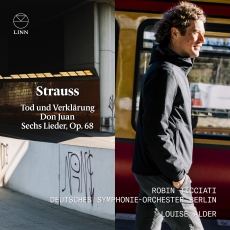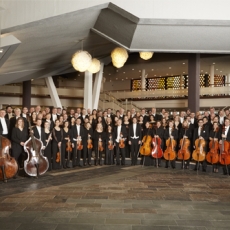Robin Ticciati, DSO Berlin & Louise Alder - Strauss - MusicWeb International
Robin Ticciati’s partnership with the Deutsches Symphonie-Orchester Berlin appears to be going from strength to strength. Certainly he is benefiting from a strong partnership with Linn Records: the team’s releases together have been characterised by inventive programming and lavish recorded sound. Furthermore, you get the strong impression that Linn are trying to market Ticciati as their fresh maestro on the block. The painfully cool booklet photos for this disc, showing him striding through various grungy Berlin locations, only reinforce this.
But the music’s the thing, and this is a great disc of Strauss, combining two supercharged tone poems with a less well known bouquet of songs. Let’s start with the tone poems, and with the brilliantly exuberant opening of Don Juan, surging upwards with sweeping strings and glittering winds, seasoned with a well-judged sprinkling of percussion. It’s a picture of dazzling energy, and it sets the scene for a technicolour reading of this great tone poem, beautifully shaped by Ticciati to reveal every facet of the hero’s multifarious character. There is elegance aplenty in the first love scene, but always with a hint of danger - of overreach, almost - so that, right from the beginning, there is a hint of the doom that hangs over the Don’s head. The great horn theme that appears at 10:18 sounds a little understated at its first appearance, very much part of the orchestral texture rather than spotlit, but this gives it somewhere to go, and serves to feed further into the narrative of the Don hurtling, by measures, towards his doom.
The orchestra play out of their skins in this music, relishing every opportunity to demonstrate their virtuosity. You get the impression that they love playing Strauss, and the solos are all done brilliantly: listen to the wry solo violin in the opening moments, full of suggestive elegance, while butter wouldn’t melt in the mouth of the gorgeous oboe solo at the seven-minute mark. The string shudder that enters the music when the Don’s fate catches up with him is marvellous, and his late, deceptive reprieve becomes all the more powerful as a result.
If Don Juan glitters then Tod und Verklärung glows, and with a marvellous variety of magnitudes. The opening has a palpable sense of weight to it, the extra bass giving it a feeling of portent and seriousness that Don Juan was far too fleet on its feet to notice. The dusky strings and plangent winds give the opening a powerful sense of space, and the launch into the violent music of pain is brilliantly controlled, Ticciati again refusing to peak too soon but settling us in for the slow burn. The orchestra sound sensation here, too. Listen to the diaphanous rippling strings that underpin the flute solo of the artist’s nostalgia, and the way the brass, channelling their finest Rheingold, build up the coda’s sensational climax, the moment where the performance’s glow really becomes incandescent.
Between these two behemoths comes a real delight in the opus 68 song cycle, also known as the Brentano Lieder, for which the orchestra is joined by Louise Alder in her freshest voice. She rides the wave of Strauss’s opulent orchestration without the merest hint of strain or strife, her rich, pearly tone fitting perfectly into the texture while at the same time commanding every nuance of both text and music, not least in the coloratura bravura of Amor. Any voice that can encompass both the wry smile of Ich wollt’ ein Sträusslein binden and the existential turbulence of the Lied der Frauen makes me want to hear a lot more from it in this sort of repertoire, so let’s hope there’s more to come. Orchestra and conductor are at their finest in An die Nacht, which sees Strauss at his most mystical and visionary, but they also bring that expansiveness to more ostensibly simple songs like Als mir dein Lied erklang! and every phrase is beautifully detailed. Full texts and translations are provided in the pleasingly glossy booklet.
Furthermore, it’s a gorgeous recording, set down in the Jesus-Christus-Kirche, no less, which audiophiles of a previous generation will recognise as being the scene of some of Karajan’s greatest recorded triumphs with the Berlin Philharmonic. The Linn engineers have done a first rate job in using it to illuminate the sound: every detail, so important in Strauss, is perfectly captured, glittering under the microphone’s microscope, and it sets the seal on a highly recommendable release.



